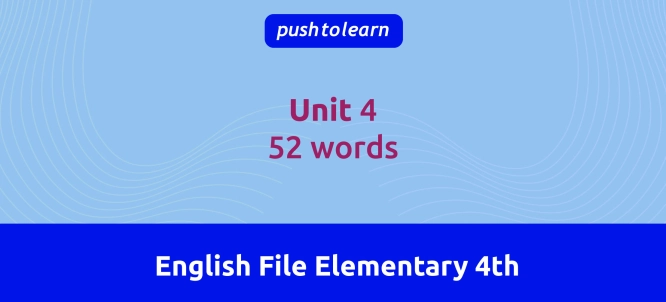by PushtoLearn
Unit 4
Table of Contents
Unit 4, English File Elementary 4th – Exercises and Flashcards
These exercises focus on Unit 4 of English File Elementary 4th
Vocabulary List for Unit 4
Family Members
-
Aunt (noun)
Definition: Your mother’s or father’s sister.
Example: "My aunt lives in a big city." -
Brother (noun)
Definition: A male sibling.
Example: "My brother plays football every weekend." -
Cousin (noun)
Definition: The child of your aunt or uncle.
Example: "My cousin is coming to visit us today." -
Grandfather (noun)
Definition: Your father’s or mother’s father.
Example: "My grandfather tells amazing stories." -
Parents (noun)
Definition: Your mother and father.
Example: "My parents work in a hospital." -
Son (noun)
Definition: A male child.
Example: "Their son is studying at university." -
Uncle (noun)
Definition: Your mother’s or father’s brother.
Example: "My uncle brought me a gift from his trip." -
Wife (noun)
Definition: A woman who is married to someone.
Example: "My uncle’s wife is very kind."
Daily Routines
-
Do exercise (verb phrase)
Definition: To engage in physical activity to stay healthy.
Example: "I do exercise every morning at the park." -
Get up at 8:00 (verb phrase)
Definition: To leave your bed at a specific time.
Example: "I get up at 8:00 on weekends." -
Go shopping (verb phrase)
Definition: To buy things from a store.
Example: "We go shopping every Saturday." -
Have breakfast (verb phrase)
Definition: To eat your first meal of the day.
Example: "I always have breakfast before school." -
Relax (verb)
Definition: To rest and feel calm.
Example: "I relax by listening to music." -
Take the dog for a walk (verb phrase)
Definition: To go outside with your dog for exercise.
Example: "I take the dog for a walk every evening."
Adverbs of Frequency
-
Always (adverb)
Definition: All the time.
Example: "I always brush my teeth in the morning." -
Sometimes (adverb)
Definition: Occasionally or not often.
Example: "Sometimes, I go to bed late on weekends." -
Never (adverb)
Definition: Not at any time.
Example: "I never drink coffee at night." -
Usually (adverb)
Definition: Most of the time.
Example: "We usually have pizza for dinner on Fridays."
Accessories
-
Bow tie (noun)
Definition: A piece of cloth tied in a bow, worn around the neck.
Example: "He wore a bow tie to the party." -
Ring (noun)
Definition: A small circular band, often worn on the finger.
Example: "Her ring has a beautiful diamond on it." -
Watch (noun)
Definition: A small device worn on the wrist to tell time.
Example: "I got a new watch for my birthday."

Full Wordlist for Unit 4, English File Elementary 4th
|
Word |
Example |
|
aunt |
Aunt Betty is very old |
|
brother |
Andy and Anna are brother and sister |
|
brother-in-law |
He's my brother-in-law |
|
children |
All his children play musical instruments |
|
cousin |
A son of your aunt or uncle is your cousin |
|
daughter |
He's got three daughters |
|
father |
Ben is Pam's father |
|
grandfather |
David's grandfather is from the USA |
|
grandmother |
Elena is my grandmother |
|
mother-in-law |
Her mother-in-law is a teacher |
|
nephew |
Does his nephew study French or Spanish? |
|
niece |
He's going to visit his niece in America |
|
parents |
Amy's parents are in Taiwan |
|
sister |
Ann is my sister |
|
son |
He has two sons |
|
stepfather |
Didier is my stepfather |
|
uncle |
He is my uncle |
|
wife |
Anna is his former wife |
|
do exercise |
Do you do exercise every day? |
|
do homework |
How often do you do homework? |
|
do the housework |
I do the housework on Saturday morning |
|
finish work at 6.30 p.m. |
I finish work at 6.30 p.m. |
|
get dressed |
After breakfast I get dressed and go to school |
|
get home late |
They often get home late |
|
get up at 8.00 |
I get up not that early at 8.00 a.m |
|
go home early |
Sometimes I go home early from work |
|
go shopping |
Did you go shopping last weekend? |
|
go to bed late |
I usually go to bed late on Friday |
|
go to work by bus |
We go to work by bus |
|
have a bath |
I don't like showers so I have a bath |
|
have a coffee |
I have a coffee for breakfast |
|
have a shower |
I get up at 5 a.m. and have a shower |
|
have breakfast |
Did you have breakfast before you left? |
|
have lunch at work |
We have lunch at work, in the cafeteria |
|
have pizza for dinner |
They often have pizza for dinner |
|
make the dinner |
Who makes the dinner in your family? |
|
relax |
A hot bath helps you to relax after a day's work |
|
take the dog for a walk |
Can you take the dog for a walk today? |
|
wake up at 7.00 |
I wake up at 7.00 a.m |
|
always |
Do you always get up at 8 am? |
|
hardly ever |
He hardly ever drinks alcohol |
|
never |
He never agrees with me |
|
normally |
He normally walks to school |
|
often |
Do you often do your homework? |
|
only |
He doesn't work in the morning, only in the afternoon |
|
sometimes |
He does cook sometimes, but not very often |
|
usually |
He doesn't usually go out in the afternoon |
|
bow tie |
Does your father wear bow ties? |
|
glasses |
Are these your glasses? |
|
relaxed |
He's a very relaxed person |
|
ring |
Around midnight, the phone rang |
|
watch |
Are you watching TV? |
|
finish work at 6.30 p.m |
I finish work at 6.30 p.m |
FAQ
How can I use adverbs of frequency in sentences?
Adverbs of frequency usually go before the main verb:
-
"I always wake up early."
Or after the verb "to be": -
"She is sometimes late."
How can I describe my family?
Use family member words and adjectives together:
-
"My grandmother is very kind."
-
"I have a younger brother and two cousins."
What’s the difference between “go to bed” and “wake up”?
-
Go to bed means to lie down to sleep.
Example: "I go to bed at 10:00 p.m." -
Wake up means to stop sleeping.
Example: "I wake up at 7:00 a.m."

